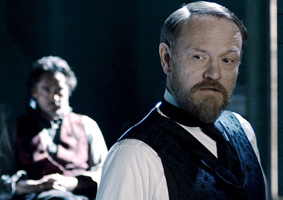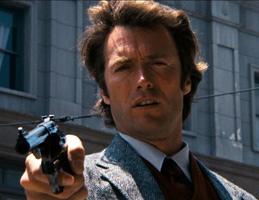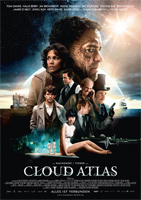The big battle has come, our hero is triumphant, and evil has been vanquished. What do we do with the bad guy now? Do we put him in jail, or do we just kill him? I don’t mean this to be a debate over capital punishment. Rather, I’m looking at what satisfies us as readers/viewers. Are we okay with putting the evil genius behind bars to contemplate his wrongdoings, or do we need the hero to plug him through the heart with his double-barreled ray gun?
I think the answer depends on several factors. What kind of villain was he? What kind of hero defeated him? What kind of world are we in, i.e. what are our genre constraints? And heck, to some extent, which direction is the wind blowing?
 Let’s start with the villain. Is he a murderer or a financial swindler? If a murderer, was this a single crime of passion or a long series of calculated assassinations? If a swindler, did he go after your grandmother’s savings, or did he take down the Italian economy? And finally, was he an average guy doing bad things, or is he truly some evil genius who will forever seek to show off his capacity for mayhem?
Let’s start with the villain. Is he a murderer or a financial swindler? If a murderer, was this a single crime of passion or a long series of calculated assassinations? If a swindler, did he go after your grandmother’s savings, or did he take down the Italian economy? And finally, was he an average guy doing bad things, or is he truly some evil genius who will forever seek to show off his capacity for mayhem?
As much as I said this wasn’t a debate about capital punishment, many of those same factors enter our literary calculations. If the villain was the guy next door who made a series of bad decisions, we’re more likely to be satisfied with locking him up for a lifetime of remorse. On the other hand, if he’s some sociopath bent on nuclear holocaust, I think we’re a little less satisfied with that plan of remorse. After all, he’s shown that he won’t feel remorse. He’ll just be plotting some other way to unleash Armageddon.
But in addition to things like recidivism and the scale of the crimes, we readers (and the hero) also make the decision based on personal feelings. Did this guy go after the hero’s own grandmother with his ponzi scheme? Was one of the slasher victims our detective’s innocent wife? For God’s sake, did that evil bitch run over my precious little six-legged space kitten?!!
These are things that would get you kicked off a jury faster than… well… I don’t know, because that’s pretty as extreme as it gets judically. We don’t let victims’ friends and families sit in judgment of the accused, but in fiction, this isn’t a jury. Our hero has the chance to be judge, jury, and executioner, and the more personal it gets, the further along that triple role our hero is going to go.
 As much as we would never condone it in our real-world judicial system, if the stakes are sufficiently personal most readers find satisfaction in a hero’s righteous revenge. I could argue that this lets us exorcise that particular demon in a safe way, but I don’t think I can argue that the demon isn’t there to begin with. Maybe that’s all hindbrain stuff that we’re trying to evolve our way out of, but for now, both we and our heroes are stuck with it.
As much as we would never condone it in our real-world judicial system, if the stakes are sufficiently personal most readers find satisfaction in a hero’s righteous revenge. I could argue that this lets us exorcise that particular demon in a safe way, but I don’t think I can argue that the demon isn’t there to begin with. Maybe that’s all hindbrain stuff that we’re trying to evolve our way out of, but for now, both we and our heroes are stuck with it.
 But not all heroes are wrathful revenge-monkeys with poor impulse control. Take Superman, for example. I’m not a huge comic collector, so I can’t speak to the eighty years of pulp canon, but from the movies and the old black-and-white TV shows, I don’t think I ever saw him kill anyone. For starters, he’s just a little too pure to kill anyone, or at least, too pure to act in vengeful anger. But also, he’s Superman. If the bad guy gets out, unleashes mayhem again, Superman can just throw him in prison again. Sure, some people get hurt along the way, but Superman’s hands are still clean.
But not all heroes are wrathful revenge-monkeys with poor impulse control. Take Superman, for example. I’m not a huge comic collector, so I can’t speak to the eighty years of pulp canon, but from the movies and the old black-and-white TV shows, I don’t think I ever saw him kill anyone. For starters, he’s just a little too pure to kill anyone, or at least, too pure to act in vengeful anger. But also, he’s Superman. If the bad guy gets out, unleashes mayhem again, Superman can just throw him in prison again. Sure, some people get hurt along the way, but Superman’s hands are still clean.
 Other heroes are happy to mete out vengeful justice on their own. Dirty Harry is a great example of this, particularly in the very first film. He has no qualms about killing the bad guy, and he’s got a 44 Magnum loaded with righteous wrath. However, as much as he is held up as the quintessential anti-hero, he still follows at least one rule. He won’t kill a defenseless criminal. That’s the deal with his whole “Do you feel lucky?” speech. He wants the bad guy to pick up his weapon to make him a legitimate target.
Other heroes are happy to mete out vengeful justice on their own. Dirty Harry is a great example of this, particularly in the very first film. He has no qualms about killing the bad guy, and he’s got a 44 Magnum loaded with righteous wrath. However, as much as he is held up as the quintessential anti-hero, he still follows at least one rule. He won’t kill a defenseless criminal. That’s the deal with his whole “Do you feel lucky?” speech. He wants the bad guy to pick up his weapon to make him a legitimate target.
That particular bit of rule-following is endemic in another type of hero, who would like to consider himself as pure as Superman but is still willing to kill. This is the hero who defeats that bad guy and then walks away, only to have the bad guy rise from the debris to take one last shot at the hero. The hero, of course, puts the bad guy down for good, usually with an unquestionably lethal act that is accomplished with trivial effort, e.g. the gunshot precisely between the eyes from fifty feet. [As a side note, when putting down your bad guys, ALWAYS double-tap. Really, I think we’ve all been burned by this enough to know that we’re not done until the double-tap.]
 But then you have some heroes who are unapologetically dishing out a chilled plate of revenge. I think of the original Mad Max where Max puts some guys behind bars for killing his partner, only to have them be let out and suffer an even greater, personal loss. The revenge orgy that ensues is enough to satisfy any grudge-meister, especially the final act of revenge. He shows no hesitation, no remorse, and absolutely no sympathy for the soon-to-be-dead bad guy. I won’t say that Max will go ape-shit if you cheat him at cards, but this is a guy that you don’t want to leave around for Act II if you can help it.
But then you have some heroes who are unapologetically dishing out a chilled plate of revenge. I think of the original Mad Max where Max puts some guys behind bars for killing his partner, only to have them be let out and suffer an even greater, personal loss. The revenge orgy that ensues is enough to satisfy any grudge-meister, especially the final act of revenge. He shows no hesitation, no remorse, and absolutely no sympathy for the soon-to-be-dead bad guy. I won’t say that Max will go ape-shit if you cheat him at cards, but this is a guy that you don’t want to leave around for Act II if you can help it.
But then there’s the world around you. The Max in that last example was living out on the frontier of the Australian outback in a time that was either during or shortly after some apocalyptic war. The remnants of civilized society weren’t working anymore, and Max had a certain amount of freedom to hunt these people down. Score one for the genre, because after the apocalypse, it’s an all-you-can-eat revenge-flavored ice cream buffet.
Compare that to Superman’s world of Metropolis. The government is stable and happy to lock up these troublemakers, if only it was strong enough to catch them. Gee thanks, Superman! I mean, it’s kind of hard to argue against incarceration there. He caught them in the act, gathered up the evidence with his free hand, and to top it off, Superman makes a great eye-witness for the prosecution. (And to top it off, Lois poisoned the whole jury pool with an exclusive article.)
Dirty Harry (and Batman for that matter) split the difference. There’s still a functioning judicial system, but it’s imperfect and apparently growing worse. We’d like to put these bad guys away, but we realize that in this particular case, we just can’t trust that the system will work. Even then, they sometimes drop the villains off at the local precinct.
But there are also genre constraints that limit the hero even more than the judicial backdrop. Action films pretty much require the villain’s death, the more spectacular the better. Even beloved villains like Hans Gruber have to take the plunge. Meanwhile, some comic stories/films require that the evil genius live to escape and fight another day. Mysteries almost always require that the villain survive because the detective has to win by intellect, not by force. Even if he proves the villain’s guilt first, it’s somehow dissatisfying if that wasn’t enough, that some additional low-brow gunplay was required to be victorious.
Finally, I’d say that the political winds of the real world effect how we and the heroes see this. In the early years of the “War on Terror” in the US, I noticed a lot less sympathy for villains, and more and more heroes did “what had to be done.” This was also true in the late 70’s through 80’s as we experienced pushback from the peace-movement 60’s and ratcheted up the cold war with the Soviets. But in the 90’s and increasingly now in the 2010’s, I saw a lot more heroes going with the equivalent of Hawaii 5-O’s “Book ‘em Danno”.
 It would seem that there are times when the unruly mob is giving a collective thumbs down, chanting “death, death” to the hapless gladiators in the arena, and sometimes we’re in a more forgiving mood. It’s easier to fine-tune that in movies which can be more timely with their audience, but it can leave some books out of step as they can find “fresh readers” twenty or thirty years later.
It would seem that there are times when the unruly mob is giving a collective thumbs down, chanting “death, death” to the hapless gladiators in the arena, and sometimes we’re in a more forgiving mood. It’s easier to fine-tune that in movies which can be more timely with their audience, but it can leave some books out of step as they can find “fresh readers” twenty or thirty years later.
So, how about you guys? What villain were you glad to see splattered? Which ones got the mercy they deserved? And which ones got away or were unfairly squished?
 I’m reviewing the movie here, not the book it was based on. I actually tried reading the book, but I have a hard time reading dialect, and both book and film half quite a bit of it. Hence, I settled for the movie.
I’m reviewing the movie here, not the book it was based on. I actually tried reading the book, but I have a hard time reading dialect, and both book and film half quite a bit of it. Hence, I settled for the movie.






